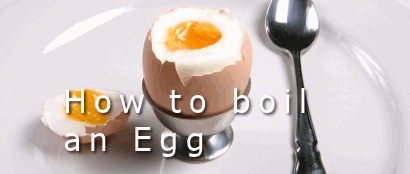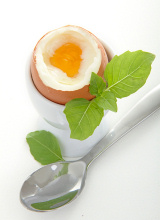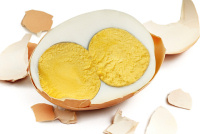How to boil an egg including tips for hard and soft boiled eggs.

Boiled eggs are quick and easy to prepare, highly nutritious and above all cost next to nothing at all.
In this guide we will take you through how to make the perfect soft or hard-boiled egg.
Advertisements
Soft-boiled eggs
Soft-boiled eggs served with soldiers are a favourite breakfast dish for many children and even some adults too.
To be precise, the eggs are not actually boiled; they are in fact simmered for a minimum of three minutes, depending on how well or how runny the diner likes his egg.

To be precise, the eggs are not actually boiled; they are in fact simmered for a minimum of three minutes, depending on how well or how runny the diner likes his egg.

The majority of people love their yolk to be runny, so that the accompanying bread soldiers can be dipped into the egg and then pulled out dripping with the delicious runny yolk.
However, with the yolk so soft, there is a danger of the white being undercooked, which could completely spoil the whole experience of eating boiled eggs with soldiers.
As you may have gathered, boiling an egg is not as easy as it sounds and producing a perfectly soft-boiled egg is in fact, all down to the timing. You may have to experiment a number of times until you find the best method of producing the perfect egg for you.
Although the timing is the most important factor, there are also other aspects that need to be considered.
First of all, the temperature of the egg before it goes in the pan to be cooked is important. Really, the egg should be cooked at room temperature, otherwise when you place it into the pan of boiling water, it will most likely crack from the pressure.
If you store your eggs in the refrigerator, they should be removed at least half an hour before you start to prepare them, as this will bring them up to room temperature. On the other hand, you may run them under a hot tap for a few minutes or add an extra minute onto the cooking times below.
Secondly, eggs that are too fresh, that is, less than five days old from the packaging date, are horrendously difficult to peel. Therefore, "older" eggs would be ideal for boiling.
The next point to consider is the size of the pan. You should always use a small pan, or a pan that is just large enough for the number of eggs that you are going to boil. This is to prevent the eggs from breaking, as they hit the other eggs or the sides of the pan during cooking.
Fill the pan with enough water to cover the eggs plus one inch and add a teaspoon of salt. This will make peeling the egg easier once it has been cooked. Bring the water to the boil.
Whilst the water is heating up, take each egg and pierce the larger, rounder end with a pin. As the egg heats up during cooking, the air cell within the egg swells and can cause the egg to crack due to the pressure and lack of escape. The pinprick in the end of the egg will allow the steam to escape instead of cracking the shell.
Once the water is gently boiling, carefully lower the eggs into the pan using a tablespoon. As the water reaches boiling point again, reduce the heat so that the water is simmering and begin timing. If eggs are cooked at temperatures that are too high, this will cause the egg white to toughen.
However, with the yolk so soft, there is a danger of the white being undercooked, which could completely spoil the whole experience of eating boiled eggs with soldiers.
As you may have gathered, boiling an egg is not as easy as it sounds and producing a perfectly soft-boiled egg is in fact, all down to the timing. You may have to experiment a number of times until you find the best method of producing the perfect egg for you.
Although the timing is the most important factor, there are also other aspects that need to be considered.
First of all, the temperature of the egg before it goes in the pan to be cooked is important. Really, the egg should be cooked at room temperature, otherwise when you place it into the pan of boiling water, it will most likely crack from the pressure.
If you store your eggs in the refrigerator, they should be removed at least half an hour before you start to prepare them, as this will bring them up to room temperature. On the other hand, you may run them under a hot tap for a few minutes or add an extra minute onto the cooking times below.
Secondly, eggs that are too fresh, that is, less than five days old from the packaging date, are horrendously difficult to peel. Therefore, "older" eggs would be ideal for boiling.
The next point to consider is the size of the pan. You should always use a small pan, or a pan that is just large enough for the number of eggs that you are going to boil. This is to prevent the eggs from breaking, as they hit the other eggs or the sides of the pan during cooking.
Fill the pan with enough water to cover the eggs plus one inch and add a teaspoon of salt. This will make peeling the egg easier once it has been cooked. Bring the water to the boil.
Whilst the water is heating up, take each egg and pierce the larger, rounder end with a pin. As the egg heats up during cooking, the air cell within the egg swells and can cause the egg to crack due to the pressure and lack of escape. The pinprick in the end of the egg will allow the steam to escape instead of cracking the shell.
Once the water is gently boiling, carefully lower the eggs into the pan using a tablespoon. As the water reaches boiling point again, reduce the heat so that the water is simmering and begin timing. If eggs are cooked at temperatures that are too high, this will cause the egg white to toughen.
Advertisements
Soft Boiled Egg Cooking Times
- If you are using large eggs, cook the eggs for 4 minutes, for a runny yolk and 6 minutes for a medium-boiled egg, where the yolk is only slightly runny.
- For medium sized eggs, reduce these cooking times by one minute.
- Extra large eggs, add on one minute.
As soon as the cooking time is up, remove the eggs from the boiling water and run them under a cold running water or immerse them in a bowl of very cold water. This will stop the eggs from cooking in their own heat and will prevent a discolouration of the egg yolk that sometimes forms.
When the eggs have cooled slightly and you are able to pick them up without scalding your fingers, position them in an eggcup with the smaller end at the bottom.
Serve with soldiers, a slice of buttered bread or toast cut into strips, and a little salt on the side of the plate.
As for tucking in to your perfectly soft-boiled egg, there are two methods of getting into the egg. Probably the most fun is to lightly bash the top of the egg with your teaspoon and peel away the shell to reveal the egg. The second method is to slice the top of the egg off using the side of your teaspoon or with a knife.
Finally the eggs will be ready to be eaten and thoroughly enjoyed.
Hard-boiled eggs

Hard-boiled eggs are much easier to cook than soft-boiled eggs, even though the method is much the same.
You can use hard-boiled eggs to fill sandwiches, make salads or even as a topping for soups.
Basically the method and the egg preparation is the same, but with hard-boiled eggs, the eggs may be placed in the pan along with the cold water rather than added once the water has begun to boil.
Once the water is boiling, the heat is reduced to a simmer and the eggs are cooked for around 10 - 12 minutes.
As with the soft-boiled eggs after cooking, the hard-boiled eggs are plunged into cold water and may be left there until they have completely cooled.
The cold water creates a layer of steam between the shell and the egg white, so that when it comes to peeling the egg, the process is much easier.
In order to peel a hard-boiled egg, simply roll the egg over a hard surface or gently tap it against a hard surface in order to crack the shell all over and then peel the shell away with your fingers. This may be done under a cold running tap, as the water will wash away any tiny bits of shell that stick to the egg.
The eggs will now be ready to incorporate into your recipe.
If you have prepared several hard-boiled eggs but do not wish to use them as yet, they may be stored in the refrigerator for up to a week, provided that they are still in their shell.
You can use hard-boiled eggs to fill sandwiches, make salads or even as a topping for soups.
Basically the method and the egg preparation is the same, but with hard-boiled eggs, the eggs may be placed in the pan along with the cold water rather than added once the water has begun to boil.
Once the water is boiling, the heat is reduced to a simmer and the eggs are cooked for around 10 - 12 minutes.
As with the soft-boiled eggs after cooking, the hard-boiled eggs are plunged into cold water and may be left there until they have completely cooled.
The cold water creates a layer of steam between the shell and the egg white, so that when it comes to peeling the egg, the process is much easier.
In order to peel a hard-boiled egg, simply roll the egg over a hard surface or gently tap it against a hard surface in order to crack the shell all over and then peel the shell away with your fingers. This may be done under a cold running tap, as the water will wash away any tiny bits of shell that stick to the egg.
The eggs will now be ready to incorporate into your recipe.
If you have prepared several hard-boiled eggs but do not wish to use them as yet, they may be stored in the refrigerator for up to a week, provided that they are still in their shell.
Advertisements
